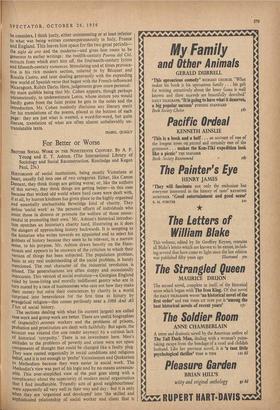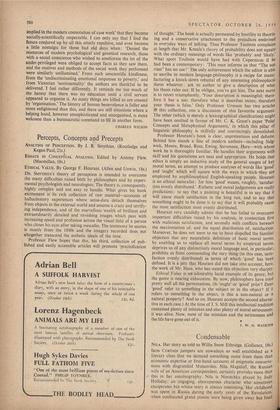For Better or Worse
HISTORIANS of social institutions, being mostly Victorians at heart, usually fall into one of two categories. Either, like Canon Demant, they think things are getting worse; or, like the authors of this survey, they think things are getting better—in this case because that wicked old world where hard cases were dealt with, If at all, by human kindness has given place to the highly organised and essentially uncharitable Beveridge kind of charity. They define 'social work' as the personal efforts of individuals who assist those in distress or promote the welfare of those unsuc- cessful in promoting their own.' Mr. Ashton's historical introduc- tion stretches an historian's charity hard, illustrating as it does the dangers of approaching history backwards. It is tempting to the historian who writes towards an appointed end to select his gobbets of history because they seem to be relevant, in a narrow sense, to his purpose. Mr. Ashton draws heavily on the Ham- monds and appears to be unaware of the criticism to which their version of things has been subjected. The population problem, basic to any real understanding of the social problem, is barely mentioned. The real character of the industrial revolution is missed. The generalisations are often sloppy and occasionally inaccurate. This version of social evolution—a Georgian England ruled by loose-living and morally indifferent gentry who are in turn ousted by a race of businessmen who care not how they make their money but salve their consciences by charity in a world surprised into benevolence for the first time in history by evangelical religion—this comes perilously near a 1066 And All That of social history.
The sections dealing with what (in current jargon) are called case work and group work are better. There are useful biographies of (especially) ...women workers and the problems of prisons, probation and prostitution are dealt with faithfully. But again, the account was vitiated (for one reader anyway) by a curious lack of historical 'sympathy.' There is no inwardness here. Men's attitudes to the problems of poverty and crime were not spare components of thought that could be changed like a faulty plug. They were rooted organically in social conditions and religious belief, and it is not enough to 'prefer' Victorianism and Quakerism to Methodism because they were easier in social work. The Methodist's view was part of his logic and by no means unreason- able. This over-simplified view of the past goes along with a complacency about the superiority of modern social organisation that I find insufferable. 'Friendly acts of good neighbourliness' were apparently all very well in their way and day : but it is only When they are 'organised and developed' into 'the skilled and sophisticated relationship of social worker and client that is implied in the modern connotation of case work' that they become socially-scientifically respectable. I can only say that I find the future conjured up by all this utterly repulsive, and even become a little nostalgic for those bad old days when: 'Denied the resources of modern psychological' and genetical research, those with a social conscience who wished to ameliorate the lot of the under-privileged were obliged to accept facts as they saw them, and the motives and methods of the social work they performed were similarly unillumined.' From such unscientific kindliness, from the 'undiscriminating emotional responses to poverty,' and from Victorian 'sentimentality' the authors are thankful to be delivered. 1 feel rather differently. It reminds me too much of the heresy that there was no education until a civil servant appeared to organise it. As many things ate killed as are created by 'organisation.' The history of human benevolence is fuller and more enlightened than this, and there are still situations where a helping hand, however unsophisticated and unorganised, is more welcome than a bureaucratic command to fill in another form.
CHARLES WILSON











































 Previous page
Previous page